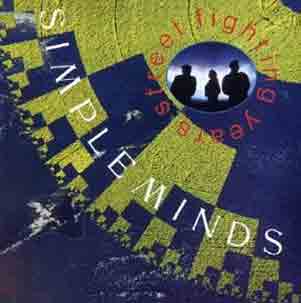Simple Minds – “Mandela Day”:
Protest as Pop, Power in Melody
Written for the Nelson Mandela 70th Birthday Tribute Concert and released as part of the Ballad of the Streets EP in February 1989, “Mandela Day” showcased Simple Minds at their most reflective and politically engaged. Known for stadium anthems like “Alive and Kicking,” the band here chose a different path: a softly insistent call for justice — not with shouts, but with shimmer and grace.
It wasn’t a protest march. It was a vigil set to music.
A Tribute with Global Weight
Premiered live at Wembley Stadium on 11 June 1988, “Mandela Day” was Simple Minds’ contribution to the global movement demanding the release of Nelson Mandela, who had at that point spent 27 years in prison under South Africa’s apartheid regime. Rather than opting for overt protest language, the song channeled a spiritual urgency — mourning injustice, honoring resilience, and offering hope.
This was political pop with a velvet touch — a song of solidarity wrapped in reverence.
Lyrical Simplicity, Emotional Power
The lyrics are minimal but piercing: “It was 25 years they took that man away / Now the freedom moves in closer every day.” With Jim Kerr’s voice rising over a spacious arrangement of synths and guitars, the track carries weight without force. The line “And I know what’s right / In this world of hate” feels less like a slogan and more like a whisper of conscience — a reaffirmation of moral clarity in dark times.
The result is a song that lingers, like a prayer echoing long after it ends.
Musical Style: Anthemic Yet Atmospheric
Sonically, “Mandela Day” is a masterclass in restraint. Its gently pulsing rhythm, ambient guitars, and echoed vocals give the track a meditative aura, quite different from the band’s more explosive hits. The version released on the Ballad of the Streets EP was self-produced by Simple Minds, with Stephen Lipson co-producing — giving it a textured, emotionally immersive sound.
Later, it appeared on the Street Fighting Years album, where Trevor Horn contributed to the wider production scope — but the heart of “Mandela Day” was already in place.
Chart and Critical Reception
Though not issued as a standalone single, “Mandela Day” was part of the Ballad of the Streets EP, alongside “Belfast Child” and a cover of Peter Gabriel’s “Biko.” The EP debuted at No. 1 on the UK Singles Chart and also topped charts in Ireland and the Netherlands. “Mandela Day” itself gained traction internationally, reaching No. 11 in France and No. 55 in Switzerland.
Critics praised the band’s nuanced approach to political songwriting, commending their ability to balance emotional honesty with melodic strength.
A Song of Solidarity
“Mandela Day” remains one of Simple Minds’ most meaningful works — not just as a tribute, but as a musical document of global unity. It played a role in turning a birthday celebration into an international moment of conscience, standing shoulder to shoulder with songs by U2, Peter Gabriel, and Tracy Chapman during a time when music truly mattered in the political arena.
Nelson Mandela was released in 1990, just two years later. The song endures in the band’s live sets — not just as a memory, but as a message that still rings true.

